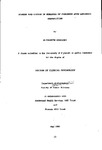STRESS AND COPING IN SIBLINGS OF CHILDREN WITH LEARNING DISABILITIES
| dc.contributor.author | GREGORY, ELIZABETH | |
| dc.contributor.other | School of Psychology | en_US |
| dc.date.accessioned | 2013-09-11T12:09:06Z | |
| dc.date.available | 2013-09-11T12:09:06Z | |
| dc.date.issued | 1995 | |
| dc.identifier | NOT AVAILABLE | en_US |
| dc.identifier.uri | http://hdl.handle.net/10026.1/1666 | |
| dc.description.abstract |
Past research investigating the siblings of children with learning disabilities has yielded inconsistent findings. Consequently, the assumption guiding present investigators is that while some children appear to be at risk psychologically, others adapt well and even benefit from the experience. This assumption may be interpreted as supporting the literature on stress and coping in children. Within this framework, variability is expected because not only are children faced with different stressors, they have a variety of resources available to protect them. A stress and coping framework was therefore adopted in the present study. It aimed to investigate the differential responses to stress of two groups of children; namely those identified as having a positive relationship and those identified as having a negative relationship with their learning disabled sibling. The study also looked at the association between satisfaction with this relationship and measures of psychological adjustment (i.e. depression and anxiety). In addition, the stability of satisfaction with the sibling relationship; the stability of coping strategies employed in response to stress arising as a result of that relationship; and parental insights into this stress was investigated. The results suggest that the nature of the sibling relationship does have an impact on depression at least. Furthermore, children rated as having a more positive relationship with their sibling were foiund to appraise and respond differently to stress than children who were rated as having a less positive relationship. Satisfaction with the sibling relationship was found to remain relatively stable over time, and the stability of coping was consistent with that expected for a process measure. Although parents were found to be good judges of the nature of the sibling relationship generally, they had little insight into the specific stressors that their children found most difficult to cope with. These findings support the need for sibling intervention programmes. Guidance as to how they might be implemented were offered, and implications for service provision more generally were discussed. Recommendations for future research were made, including an abandonment of the framework of assumed pathology that has dominated the field to date. Indeed, although the findings suggest that some children cope better than others, most seem to manage the stress they face very well, and have a great deal of love and affection for their brother or sister with learning disabilities. | en_US |
| dc.description.sponsorship | Southmead Health Services NHS Trust and Phoenix NHS Trust | en_US |
| dc.language.iso | en | en_US |
| dc.publisher | University of Plymouth | en_US |
| dc.title | STRESS AND COPING IN SIBLINGS OF CHILDREN WITH LEARNING DISABILITIES | en_US |
| dc.type | Thesis | |
| plymouth.version | Full version | en_US |
| dc.identifier.doi | http://dx.doi.org/10.24382/3621 | |
| dc.identifier.doi | http://dx.doi.org/10.24382/3621 |
Files in this item
This item appears in the following Collection(s)
-
01 Research Theses Main Collection
Research Theses Main


